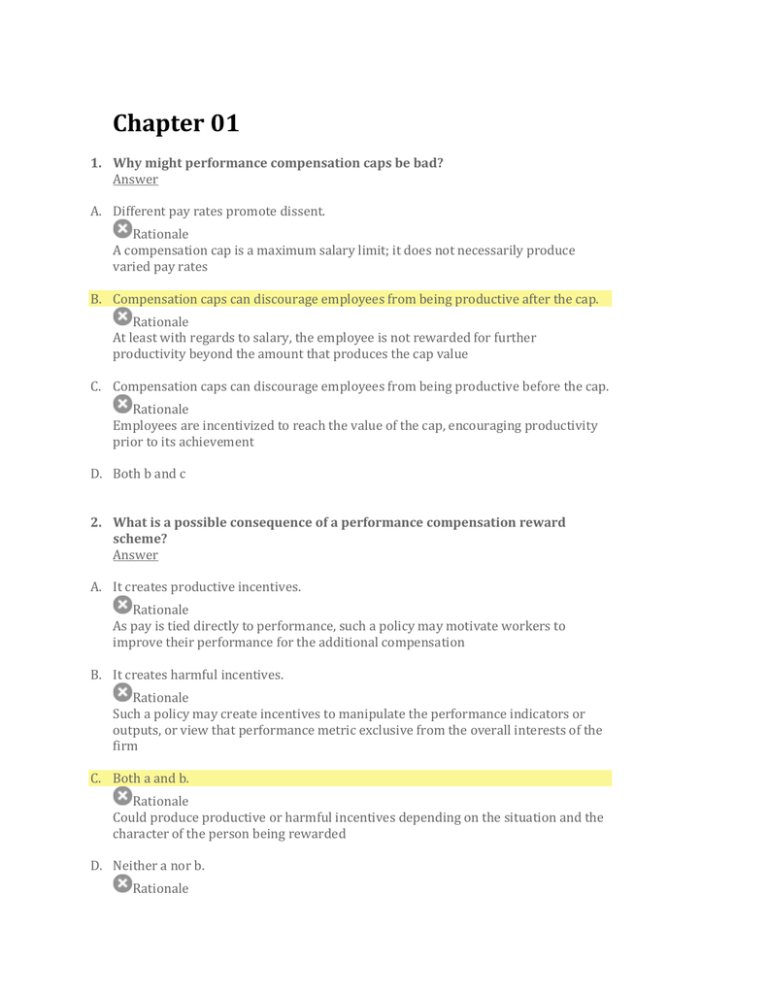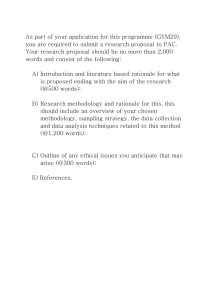Froeb Chapter 01 - Multiple-Choice Practice Problem Answers with Explanations
advertisement

Chapter 01 1. Why might performance compensation caps be bad? Answer A. Different pay rates promote dissent. Rationale A compensation cap is a maximum salary limit; it does not necessarily produce varied pay rates B. Compensation caps can discourage employees from being productive after the cap. Rationale At least with regards to salary, the employee is not rewarded for further productivity beyond the amount that produces the cap value C. Compensation caps can discourage employees from being productive before the cap. Rationale Employees are incentivized to reach the value of the cap, encouraging productivity prior to its achievement D. Both b and c 2. What is a possible consequence of a performance compensation reward scheme? Answer A. It creates productive incentives. Rationale As pay is tied directly to performance, such a policy may motivate workers to improve their performance for the additional compensation B. It creates harmful incentives. Rationale Such a policy may create incentives to manipulate the performance indicators or outputs, or view that performance metric exclusive from the overall interests of the firm C. Both a and b. Rationale Could produce productive or harmful incentives depending on the situation and the character of the person being rewarded D. Neither a nor b. Rationale Performance compensation schemes will produce some kind of incentives 3. Which of the following is NOT one of the three problem-solving principles laid out in Chapter 1? Answer A. Under whose jurisdiction is the problem? Rationale This is NOT one of the key problem solving principles B. Who is making the bad decision? Rationale This is one of the key problem solving principles C. Does the decision maker have enough information to make a good decision? Rationale This is one of the key problem solving principles D. Does the decision maker have the incentive to make a good decision? Rationale This is one of the key problem solving principles 4. Why might it be bad for hotels to not charge higher prices when rooms are in higher demand? Answer A. Arbitrageurs might establish a black market by reserving rooms and then selling the reservations to customers. Rationale This black market allows the arbitrageurs to capture the value of the increased demand rather than the hotels, who are providing the rooms, as well as creating a less reliable system for the consumer B. Rooms may be rationed. Rationale If demand increases but prices do not, demand for rooms may exceed supply, forcing the hotel to ration the rooms and turn customers who would have been willing to pay higher rates away C. Without the profit from these high demand times, hotels would have less of an incentive to build or expand, making the long-run scarcity problem even worse. Rationale Such a policy essentially creates a performance cap on the hotels, limiting their profitability to the number of rooms rather than overall demand D. All of the above Rationale All of these are potential negative impacts of hotels not adjusting prices to accommodate demand 5. The rational-actor paradigm assumes the people do NOT Answer A. Act rationally. Rationale The rational actor paradigm does assume that people act rationally B. Use rules of thumb. Rationale The rational actor paradigm assumes people will act rationally, optimally and selfinterestedly. Rules of thumb will only be used if they meet those three specific parameters C. Act optimally. Rationale The rational actor paradigm does assume people will act optimally, selecting or creating the outcome that provides them with the most benefit D. Act self-interestedly. Rationale The rational actor paradigm does assume that people will act in their own best interest 6. The problem-solving principles analyze firm problems Answer A. From the organization’s point of view. Rationale Considering a problem from the view of the overall organization will help ensure all elements and impacts are considered. B. From the manager’s point of view. Rationale Managers are also employees of the organization; thinking of a problem from only their perspective may overlook its impact on the company as a whole C. From the worker’s point of view. Rationale Thinking about a problem only from the employee’s point of view risks missing the fundamental problem of goal alignment with the overall organization D. Both a and b. Rationale Think about problems from the perspective of the overall organization, not its employees 7. Why might welfare for low-income households reduce the propensity to work? Answer A. It will not. Rationale It can if working can only provide similar benefits to those that can be received from welfare without working B. It reduces the incentive to work. Rationale Those receiving welfare may have less incentive to work if the benefits of working are similar to or worse than those that are received without it. Additionally, welfare may reduce the value of working for higher income workers who have to support the system, also reducing their incentives C. It is unfair. Rationale Perception of fairness alone will not alter the propensity to work unless it also has an effect on the value of that work for the individual, which would impact his overall incentives D. It encourages jealousy. Rationale Jealousy itself will not alter the propensity to work unless it also impacts the perceived value of that work, which changes the incentives 8. Why might a “bonus cap” for executives be a bad policy for the company? Answer A. It isn’t. Executives shouldn’t make more than a certain amount. Rationale Just like other types of employees, setting a maximum value for executives eliminates the ability to separate, reward and motivate them based on their performance B. It would sow discontent. Rationale Even if discontented, the rational actor paradigm indicates executives would still perform to reach the cap value in order to maximize their bonus C. It would encourage laziness after the executives reached the cap. Rationale Limiting the bonus may reduce the incentive of executives to continue improving or performing once it is achieved D. The cap could be set too high, so executives may work too hard and not reach it. Rationale This is a problem not with the cap itself, but with the level, which can be adjusted as needed 9. What might happen if a car dealership is awarded a bonus by the manufacturer for selling a certain number of its cars monthly, but the dealership is just short of that quota near the end of the month? Answer A. It may sell the remaining cars at huge discounts to hit the quota. Rationale The loss of income from the reduced rate will be offset by the manufacturer’s bonus B. It creates an incentive to sell cars from different manufacturers. Rationale The dealership is more inclined to sell cars from the manufacturer providing the bonus C. It would ruin the relationship between dealer and manufacturer. Rationale The dealer is working to meet the requirements of the manufacturer to achieve the bonus 10. Why might a supermarket advertise low prices on certain high-profile items and sell them at a loss? Answer A. It is a way for companies to be charitable. Rationale The rational actor paradigm tells us the firm will act in its own self-interest B. The store will sell other groceries to the same customers, often at a markup. Rationale By using the discounted items to bring consumers into the stores, the supermarket can profit by increasing the prices on the other items they will purchase while they are there C. They would not. Rationale Actually, they do quite often. Can you think of why this may be? D. This reduces the incentives of trade. Rationale Trade incentives do not apply in this case
